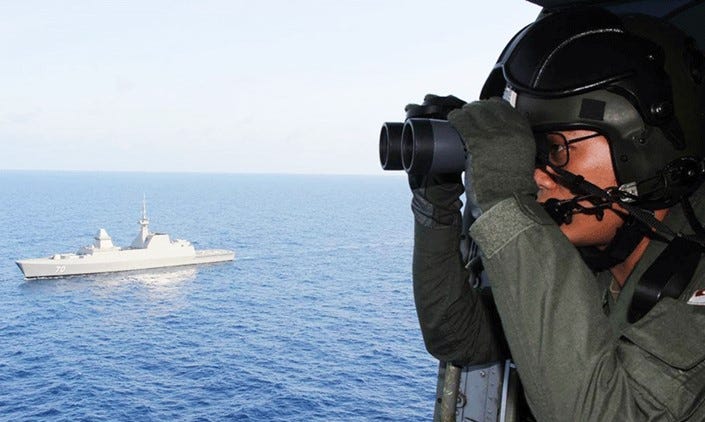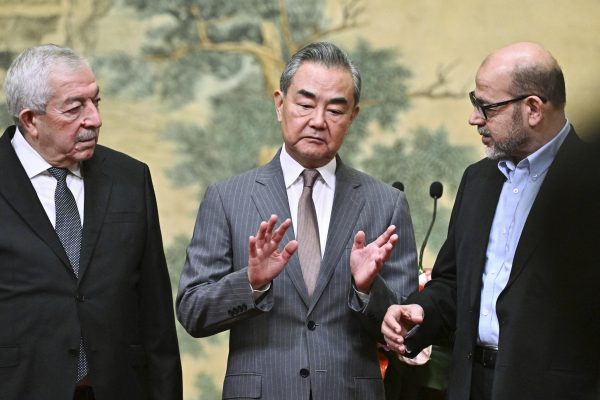
When a Chinese language armed forces delegation visited the Indian Ocean states of Maldives, Sri Lanka, and Nepal within the second week of March, it signaled not simply the navy arrival of China within the area but in addition reveals a radical reconfiguration of the area’s geopolitics in favor of Beijing to the rising drawback of India. Towards the backdrop of rising India-China rivalry within the Indian Ocean and New Delhi’s key function within the US-led alliance that seeks to roll again and ‘comprise’ China’s affect, it is a main setback to ambitions to graduate to the standing of a significant regional energy.
The go to adopted an earlier resolution by the Maldives authorities to have India withdraw its troops from the island nation. China is clearly changing India in Maldives because the nation’s predominant safety associate. Because it stands, Maldives has already introduced a “navy help” take care of Beijing.
Maldives can also be a rustic that owes greater than 40 % of its exterior debt to China. (In 2021, this was about US$3 billion.) In his newest go to to China, Maldives President Mohamed Muizzu requested Beijing to restructure its debt compensation. That request got here in opposition to a revelation by the president that the nation was going through difficulties in finishing up improvement tasks whereas “we try to handle debt.” But, the nation additionally introduced recent offers (the quantity of the deal was not disclosed) with China to construct new infrastructure, as if the restructuring of the debt compensation grew to become doable solely as a result of China was allowed new ventures to earn extra money in the long term.
However China’s transfer is just not merely an consequence of what the West likes to name “debt lure” diplomacy. It’s primarily motivated by India’s rising embrace of the US within the Indo-Pacific area, India’s personal ambitions to deal with the area as its unique zone of affect, and the regional states’ personal rising apprehension of India’s pro-West geopolitics.
China, however, has its personal ambitions that conflict with India’s and its extra-regional allies. From a Chinese language perspective, the thought is to construct huge networks of commerce which emerge from inside China and permit Beijing to relocate its surplus business. Finally, the plan is to present China a disproportional geoeconomic presence alongside these networks, which is solely unhealthy information for nations like India.
Slowly however certainly, nations that till just lately gave the impression to be securely within the Indian nexus are slipping out. Because the ouster of Gotabaya Rajapaksa in July 2022, Sri Lanka has moved extra clearly in the direction of China. India was the primary nation that Gotabaya had visited proper after his victory within the presidential elections in 2019. However ever since Ranil Wickremasinghe grew to become Sri Lanka’s president in 2022, he has pushed to pivot his nation in the direction of China.
Whereas Ranil was beforehand seen as pro-west, his final time period as prime minister between 2016 and 2019 didn’t see any tangible investments from the west for the nation. Whereas Ranil was in a position to safe a US$3 billion bundle from the Worldwide Financial Fund, his regime continues to rely extra on China than India for non-IMF sources of assist. Most significantly, Ranil was in a position to make a debt restructuring take care of China amidst the disaster – a improvement that helped Sri Lanka get the second tranche of a US$2.9 billion bailout bundle earlier accepted by the IMF.
Whereas India additionally supplied US$4 billion to Sri Lanka in 2022 and Modi has indicated New Delhi’s intention to spend money on Sri Lanka’s power sector, China continues to out-invest India. In late November, Sri Lanka accepted Chinese language state-owned oil big Sinopec’s proposal to construct a US$4.5 billion refinery within the southern port of Hambantota, the only largest funding in Sri Lanka because the financial disaster of 2022. This funding footprint is along with the truth that China is Sri Lanka’s single largest international lender, out-investing all different exterior actors.
Like Maldives and Sri Lanka, Nepal is one more nation within the area the place China seems to be displacing India. A serious glimpse got here two weeks in the past when Prime Minister Pushpa Ok. Dahal changed his pro-India coalition associate with staunch pro-China ally Ok.P. Sharma Oil, head of the Communist Celebration of Nepal.
After the formation of the brand new authorities, the brand new international minister, who can also be the nation’s deputy prime minister, selected China for his maiden tour. He will likely be discussing new offers and assembly with officers of the Chinese language Communist Celebration.
China’s International Ministry Spokesperson Lin Jian, reacting to the upcoming go to, mentioned that “China stands able to work with Nepal to take this go to as a chance to additional ship on the essential widespread understandings between leaders of the 2 nations, deepen political mutual belief, pursue high-quality Belt and Highway cooperation, develop exchanges and cooperation in varied areas and try for brand new progress in constructing China-Nepal strategic partnership of cooperation that includes ever-lasting friendship for improvement and prosperity.” Lin additionally talked concerning the upcoming go to of Sri Lanka’s prime minister, additional reinforcing the Indian Ocean area’s pivot to Beijing.
These states haven’t deserted India in favor of China nor will transfer on this path. Many, similar to Sri Lanka, will proceed to have sturdy ties with India. Having mentioned that, the rising sample reveals that they’re explicitly transferring in the direction of a extra regionally targeted geopolitics. Whereas India can also be a regional participant, its standing within the area is kind of explicitly tied to Washington, which, for a few of these states, is just not a superb signal, primarily due to the strictly navy nature of the US engagement within the area.
To date, the US has primarily pushed the so-called Quadrilateral Dialogue, or QUAD as the principle face of its presence within the Indian Ocean. Whereas preparations just like the QUAD is perhaps a necessity for nations like India and Japan that concern China’s rise, smaller states don’t essentially profit from it, nor do preparations like QUAD handle their core financial points.
That is one key purpose why many states within the area have developed a way of apprehension vis-à-vis the character of India’s geopolitics. Whereas India continues to retain affect in nations like Bhutan and Bangladesh, experiences point out China’s push for a fast consensus round a Sino-Bhutanese territorial settlement, talks for which started late final 12 months. India’s Modi is on a go to to Bhutan already. This go to is available in anticipation of this settlement bringing a radical shift in Bhutan’s ties each with India and China. It stays to be seen whether or not New Delhi can offset it to stay aggressive within the area or not.


.jpg&h=630&w=1200&q=75&v=20170226&c=1)




